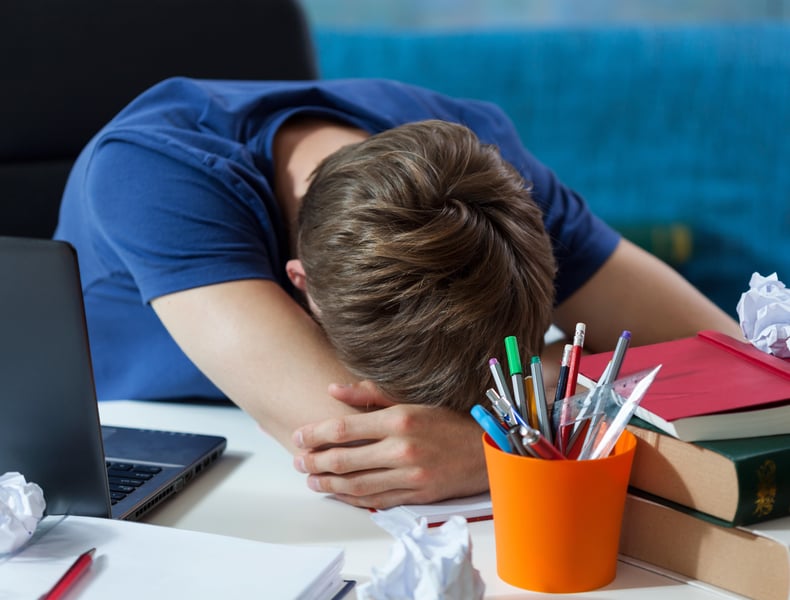Get Healthy!

- Denise Mann
- Posted February 14, 2023
Less Sleep Brings Worse Grades for College Kids, Study Finds
Late-night cramming, hall parties and other nocturnal activities can rob college kids of sleep, taking a big toll on grade point averages.
Freshmen who racked up fewer than 6 hours of sleep a night saw a drop in their end-of-term GPA, new research showed. For every hour of nightly sleep lost, there was a .07 decrease in GPA.
The American Academy of Sleep Medicine says college kids should aim for 7 or more hours of sleep each night.
"First-year college students are only [getting] about 6.5 hours of sleep each night, which is significantly below the recommended needs for these young adults, and this has real consequences for their academic achievement,"said study author J. David Creswell, a professor of psychology at Carnegie Mellon University in Pittsburgh.
What's robbing frosh of much-needed shut-eye? The list is lengthy, he said.
"First-year college students have a lot of competing pressures on their nightly sleep, ranging from a desire to study more to wanting to build new friendships,"Creswell said. "These challenges often create sleep debt cultures on college campuses, making it hard for students to protect time needed to sleep."
College kids must learn to prioritize sleep, he said.
"Research like this showing that there are real academic consequences to cutting your nightly sleep short can help students appreciate the value that good sleep practices can bring,"Creswell said. "A good night's sleep carries a lot of value for those achievement goals."
For the study, more than 600 college first-years at three U.S. universities participated in five studies. Students wore watch-like devices to track their sleep.
On average, students slept 6 hours and 29 minutes a night during the week and racked up an additional 29 minutes of slumber on weekends. Students' average bedtime was 2:01 a.m., and they woke around 9:17 a.m., the study found.
The findings were published Feb. 13 in the Proceedings of the National Academies of Sciences.
"The study provides a nice reminder to college students in general that sleep is so important, and lack of sleep can take a toll on GPA,"said sleep expert Dr. Raj Dasgupta. He is an associate professor of clinical medicine at the University of Southern California's Keck School of Medicine.
The first year of college can be overwhelming, and sleep is often the first thing to be sacrificed.
"It's hard to set a bedtime routine in college whether you are living in a dorm or in a fraternity house,"said Dasgupta, who has no ties to the new study.
There are ways that college students can improve sleep, he said.
For starters, Dasgupta recommends establishing and maintaining morning and bedtime rituals, such as getting up and going to bed at regular times.
"Consider developing a routine that evokes calm and relaxation both in the morning and at night, and also allow ample time to wake, reflect and prepare for the day ahead,"Dasgupta suggested.
Creating a comfortable sleep environment also helps.
"Keep the room temperature cool, use an eye mask, and try a white noise machine to block noise or distractions,"Dasgupta said. "Only use the bedroom for sleep, not for watching TV or reading a book." This isn't always easy in tiny dorm rooms, he conceded.
"Turn off electronics 30 to 60 minutes before bedtime, and silence your notifications and charge your devices away from your bed, so you are not tempted to look at social media or news alerts,"Dasgupta said.
Also, try to limit caffeine after lunch and avoid alcohol near bedtime, as both can disrupt sleep.
"If you are hungry after dinner, keep snacks small, sugar-free and easily digestible so as to not disrupt sleep,"Dasgupta advised.
More information
The American Academy of Sleep Medicine offers more tips on healthy sleep.
SOURCES: J. David Creswell, PhD, professor, psychology, Carnegie Mellon University, Pittsburgh; Raj Dasgupta, MD, associate professor, clinical medicine, Keck School of Medicine, University of Southern California, Los Angeles; Proceedings of the National Academies of Sciences, Feb. 13, 2023







